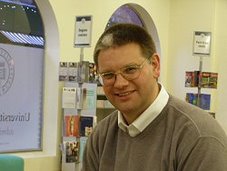In order to observe the effectiveness of this approach I was standing at 8.30 in the morning in front of 16 rather nervous and strained law applicants, listening as the law tutors introduced the interview team, and explained the structure of the day. Candidates would have two interviewers, and the focus of the discussion would be on some case extracts that the candidates would receive 75 minutes in advance of the interview. Candidates had a number of questions to answer, which were printed on the cover sheet of the extracts; knowledge of the law was not required, but the students would have to be able to interpret complex information and explain and summarise material.
The interviewers were very good at delivering what was an important message in a very encouraging manner. They were very straight-talking, emphasising that the interviews were only one part of the process in identifying the successful candidates, and stressing the importance to the interviewees of engaging in discussion - it was OK for a candidate to revise their views as a result of the interaction with the interviewers, as long as they could explain how they reached their conclusion clearly. The mood of suppressed panic in the room began to lift, and after 20 minutes the students were even beginning to smile. Then, disaster struck, as some one's mobile phone went off.
The ring tone of the phone was quite understated, and it wasn't immediately obvious what was causing the noise - gradually the tone grew louder; the interviewers to their credit ignored it, and kept on speaking, but it was clear that there was at least one person in the room who (internally at least) was going through a thousand years of agony in the space of a moment. Eventually the caller must have triggered the answer-phone, because the tune stopped, although we were then treated to a couple of loud beeps as the phone let its owner know that they had received an important message.
The briefing continued, the interviewers making a point about their intention to push the candidates hard, and in the supplementary questions towards the end of the interview they would ask about issues that had no clear right or wrong answer, but would require the applicant to take an ethical or moral stance.
Things were winding down, and the candidates were beginning to ask questions, when the mystery caller struck again - once more, the guilty party maintained a superb poker face, and let the call play out, although their self-control must have been at breaking point.
The Law Faculty typically only invites about 50% of their applicants to interview, following the initial scrutiny of applications, references and LNAT test results - for me the experience emphasised that the level of competition to do well and be successful for the candidates is so intense that a student will sit through the entire rendition of their most recently down-loaded ring-tone rather than indicate any possible fallibility on their part. It was a sobering thought. The silver lining however is that I guarantee that all 16 of the candidates in the room made sure that they were not going to fall victim to the same situation when it came to the real interview.
